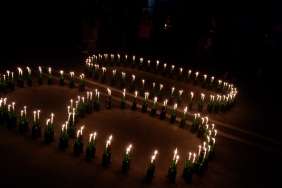USE PUBLIC TRANSPORTATION FOR A HEALTHIER EARTH
Jakarta - Earth Hour, as the largest grassroots movement for the environment, will again bring together millions of people around the world to show their commitment to the planet. As global biodiversity declines at an unprecedented rate, coupled with the ever-present challenge of climate change, Earth Hour 2019 will focus its efforts on raising awareness and inspiring action to reduce greenhouse gas emissions to mitigate the impacts of climate change.
On Earth Hour 2019, WWF-Indonesia and Earth Hour Communities in 30 cities invite the President of Indonesia, city leaders, local governments, corporate leaders and the public, especially the younger generation, to be part of the conversations and solutions needed to build a healthy and sustainable future - and planet - for all. WWF hopes to raise awareness of more than 5 million young people to adopt greener and more sustainable lifestyles by 2020, one of which is the use of public transportation to reduce greenhouse gas (GHG) emissions.
"Earth Hour is a moment to restore a better relationship between humans and nature, and to put environmental conservation at the top of national and local agendas," said Rizal Malik, CEO of WWF-Indonesia. "The Indonesian government is committed to reducing greenhouse gas emissions by 29% by 2030, and 11 percent of this is from public transportation, so the public must also participate by using public transportation," Rizal continued.
Based on data from the Ministry of Energy and Mineral Resources, energy consumption in the transportation sector in 2007 was 29% and increased to 47% in 2017. (source: Handbook of Energy economic Statistic of Indonesia 2018, Ministry of Energy and Mineral Resources). In 2016, the transportation sector produced emissions of 1.28 million tons with an average increase of 6.7% per year. This increase in emissions was 1.5 times greater than its fuel consumption. (Source: Study on the Use of Local Emission Factors (tier 2) in the GHG inventory of the energy sector, Center for Energy and Mineral Resources Data and Information Technology, Ministry of Energy and Mineral Resources).
President Director of PT MRT Jakarta, William P Sabandar, said that MRT Jakarta is committed to supporting the Earth Hour 2019 movement to reduce the impact of global warming. MRT Jakarta actively invites Indonesians to jointly implement environmentally friendly lifestyles, for example by switching from private vehicles to public transportation and prioritizing energy savings to reduce greenhouse gas emissions."
Agung Wicaksono, Director of TransJakarta stated, "CO2 emissions from transportation contribute up to 46% of emissions in urban areas, especially when using private vehicles. TransJakarta strives to make it easier for citizens to take mass transportation by integrating its routes and bus stops with MRT, LRT, and KRL. Both feeder routes from residential areas in the south to Lebak Bulus and Fatmawati, as well as connecting routes from the MRT in the city center such as Dukuh Atas and HI. In the future, even electric mobility can be an option to reduce emissions again, through trials first."
A recent WWF study in 10 of the world's most biodiverse countries found that only 40% of people associate the benefits of nature with necessities of life such as food, water and fresh air. In an effort to build public awareness about the value of biodiversity and nature, by initiating a global conversation on issues such as climate action, healthy oceans and sustainable business practices at Earth Hour 2019, WWF has partnered with the UN Convention on Biological Diversity to create a connect2earth.org.
"Nature is essential in everyday life for everyone. But what we are doing is pushing the planet to its limits and nature is under threat," said Marco Lambertini, Director General, WWF International. "Now is the time to act. Earth Hour 2019 is an unmissable opportunity to create a collective movement to tackle climate change."
With the Earth Hour Community, WWF-Indonesia will also initiate the planting of 20,000 mangrove seedlings in 13 regions. Like coral reefs, mangrove forests are highly productive ecosystems that provide many natural resources that are good for the marine environment and people. Indonesia is home to a quarter of the world's mangrove forest population, and conserving mangroves is critical in mitigating further damage to biodiversity and climate change.
Visit www.earthhour.org. to get information on activities at locations around the world and read individual stories about what they are doing for our planet. It is time for us to protect a healthy, sustainable future for all.
---Finished---
Note to Editor:
Link to Earth Hour 2019 video
https://www.youtube.com/watch?time_continue=2&v=wQ6S-pkbgB0
Link to Giphy Earth Hour channel
https://giphy.com/earthhour
For more information, please contact:
- Diah R. Sulistiowati, Education for Sustainable Development Manager | Email dsulistiowati@wwf.id | +62 811 1004 397
- Galih Aji Prasongko, Youth & Community Engagement Specialist | Email : gprasongko@wwf.id | +62 856 9240 0192
- Karina Lestiarsi, Media Relations Specialist | Email: klestiarsi@wwf.id | +62 852 1816 1683


